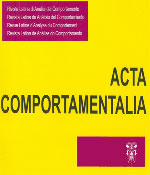Linguagem e Instituições Sociais em Skinner e Austin
DOI:
https://doi.org/10.32870/ac.v15i2.14521Palavras-chave:
linguagem, comportamento verbal, convenções, Skinner, Austin.Resumo
O presente trabalho discute o problema da linguagem a partir de uma oposição entre os que a concebem como um sistema de representação da realidade e os que a interpretam como um modo de ação do homem no mundo. O trabalho foi orientado por dois conjuntos de referências conceituais: a) a filosofia, especificamente a filosofia analítica, a partir de Wittgenstein e da análise da linguagem ordinária encontrada na teoria dos atos de fala de J. L. Austin; e b) a psicologia, em particular o behaviorisMo radical de B. F. Skinner. O trabalho tem por objetivo examinar como são elaborados a relação entre linguagem e realidade e o caráter social das práticas lingüfsticas em algumas obras de Skinner e Austin para, a partir disso, discutir possíveis aproximações com respeito às questões referidas. Um primeiro ponto de convergência identificado diz respeito à aproximação de Skinner e Austin a uma tradição antirepresentacionista. Em ambos, encontra-se a funcionalidade como critério de verdade. Um outro ponto foi o papel das convenções na definição das práticas de uma comunidade Iingüistica (ou verbal). Este ponto foi elaborado a partir da noção de regras e critérios, em Wittgenstein, passando pelo condicionamento operante em uma comunidade verbal, em Skinner, e pelos procedimentos e pela doutrina das infelicidades, em Austin. A partir dessas questões, fez-se ainda um levantamento de informações acerca da noção de significado em Skinner e da noção de força ilocucionária em Austin, cuja convergência encontra-se justamente no caráter social das práticas lingüisticas. Um último ponto discutido faz referência à compreensão ou apreensão do significado ou força ilocucionária como critério para a eficácia de uma dada ação realizada.
Downloads
Downloads
Como Citar
Edição
Seção
Licença

<a rel="license" href="http://creativecommons.org/licenses/by-nc-sa/4.0/"><img alt="Licencia de Creative Commons" style="border-width:0" src="https://i.creativecommons.org/l/by-nc-sa/4.0/88x31.png" /></a><br />Este obra está bajo una <a rel="license" href="http://creativecommons.org/licenses/by-nc-sa/4.0/">licencia de Creative Commons Reconocimiento-NoComercial-CompartirIgual 4.0 Internacional</a>.






